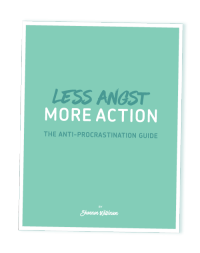 This was originally sent only to my email list. The topic seems important as we’re moving through this time of transition, from summer into fall, and feelings of stress are heightened.
This was originally sent only to my email list. The topic seems important as we’re moving through this time of transition, from summer into fall, and feelings of stress are heightened.
I hope you enjoy it!
* * *
I’ve been hearing lots from my clients about stress lately. Stress about time, about money, about diet. It seems if something exists, someone has found a reason to stress about it.
One definition of stress is not accepting that things are the way they are. In other words, wishing things were different.
I do that.
I did this the other day, when I took my mountain bike out for a spin. Suffice it to say, wishing my mountain bike rode more like my road bike caused me undo stress for the first part of the ride.
What happened, was that I was giving meaning to the differences, and getting emotional about them. I wasn’t observing in a detached way, but rather feeling (and believing) this is different, it’s bad, I wish it was different.
Know what I mean?
How many times do you see something and jump to a conclusion about what it means?
And I mean, “means” in a larger sense. It’s good to know that a green light means you can go, but there’s no reason to say it’s a good or bad thing, or that making a green light means anything about you as a person. But think through your day, how many times did you deem something was good or bad today?
Why do we do that?
We’re meaning-makers. We can’t help it. That’s what makes us human. Labeling and sorting things, allows us to quit thinking about them so much, so we can deal with the other 9 gazillion things that cross our path in a day.
Consider doors.
Take a moment to walk through your day and all the doors you walk through. This wooden one is a door, this glass one also a door, and that metal one is a door too. You walk through them pretty much all the same way. No need to discover, decipher and decide how to deal with each door you come across. You universally understand doors.
That’s the key.
We want to understand. Creating meaning gives us a kind of understanding.
However, when our emotions and judgments get involved, it’s a false understanding.
Mmmmm, chocolate.
For instance, if you have a piece of chocolate today, and then you decide to have another piece of chocolate, even when you told yourself you wouldn’t, what kind of understanding do you come to?
You might have started at the beginning, with the idea that one of piece of chocolate is okay, but a second piece is bad. And then after you ate the second piece, you might have decided that it means that you lack willpower, that you’re self-sabotaging yourself, that you are a bad person.
Pause.
Stop for a moment, and imagine what else it could mean. Perhaps it means that you feel a little lost in your life right now and chocolate gives you a little comfort. Maybe it means you really love the way the chocolate tasted and that’s as far as you got before eating it.
Stop again, and consider what if eating the second piece of chocolate meant absolutely nothing. What if you took a step back and just noticed what happened. You ate a piece of chocolate. You ate a second piece of chocolate.
Let that be it.
When the resistance dissolves, so does the stress of wanting things to be different.


Leave a Reply